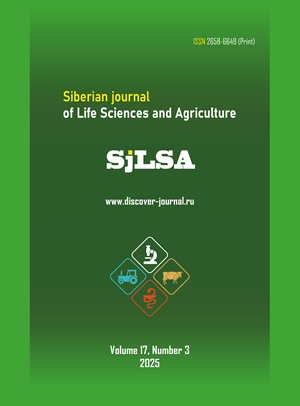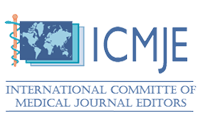The effect of Lallemantia royleana seeds extract in modifying the inflammatory response and BAX protein expression in the kidney tissue of albino mice that treated with Rifadin
Аннотация
Background. It has become known that the repeated use of therapeutic drugs for some medical conditions is accompanied by the appearance of side effects from these drugs, so many have resorted to using alternative medicine to treat some diseases or to reduce the symptoms of the disease due to the effective substances that herbs and medicinal plants contain.
Purpose. The aim of this study is to examine the effects of Lallemantia royleana (Balangu) seed extract in modifying the inflammatory response and BAX protein expression as a marker of cell death after treatment with Rifadin.
Materials and methods. Twenty-four Swiss albino mice, 5 weeks old, were divided into four groups: 1) control group treated with normal saline, 2) group treated with 1.5 mg/kg/day Rifadin, 3) group treated with Lallemantia royleana (Balangu) seed extract, 4) group treated with Lallemantia royleana seed extract and Rifadin. After 30 days, the animals were sacrificed, the kidneys were collected, and placed in a 10% formalin fixative. Slides were prepared for histological examination and to detect the expression of BAX protein by IHC technique.
Results. The results showed , there are many pathological and inflammatory changes in group treated with Rifadin (1.5mg/kg/day) compared with control group, these changes represented by severe congestion of blood vessels and hemorrhage in cortex and medulla regions of kidney with appearance of fibrosis and infiltration of leukocytes .in the group that treated with Lallemantia royleana seeds extract there was no disintegration observed in the kidney's tissue with moderate congestion and hemorrhage, while there was moderate disintegration in the kidney tissue with mild to moderate congestion , hemorrhage and leukocytes infiltration in albino mice that treated with Rifadin and Lallemantia royleana (Balangu) seeds extract together. The expression of BAX protein ranged from strong, mild, moderate immune reaction between the groups respectively compared with the control group.
Conclusion. The conclusion of this research is that the alcoholic extract of Lallemantia royleana seeds plays an effective and protective role in safeguarding kidney tissue from the harmful effects of Rifadin.
EDN: BGDWZP
Скачивания
Литература
McHugh, T. D. (2013). Tuberculosis laboratory diagnosis and treatment strategies. London, UK: CAB International. 283 p. https://doi.org/10.1079/9781845938079.0000
Grayson, M. L., Crowe, S. M., McCarthy, J. S., Mills, J., Mouton, J. W., Norrby, S. R., Paterson, D. L., & Pfaller, M. A. (2010). Kucers The Use of Antibiotics: A Clinical Review of Antibacterial, Antifungal, Antiparasitic, and Antiviral Drugs. USA: Taylor & Francis Group, LLC. 6th ed. 3049 p.
Eriksson, H. K., Lazarinis, S., Järhult, J. D., & Hailer, N. P. (2023). Early Staphylococcal Periprosthetic Joint Infection (PJI) Treated with Debridement, Antibiotics, and Implant Retention (DAIR): Inferior Outcomes in Patients with Staphylococci Resistant to Rifampicin. Antibiotics Basel, 12(11), 1589. https://doi.org/10.3390/antibiotics12111589 EDN: https://elibrary.ru/uhdkfp
Peters, D. E., & Chike, A. O. (2013). Effect of Rifampicin on the Kidney of Albino Rats. Appl. Sci. Environ, 17(1), 125-151.
Abdulhussein, M. F., & Al-Asady, Z. T. S. (2020). Hepatoprotective Effect of Lallemantia Royleana Seeds Extract Against the Toxicity of Rifadin Through Reduction of BAX Expression in Liver Tissue of Albino Mice. J. Phys.: Conf. Ser., 1660, 012012. https://doi.org/10.1088/1742-6596/1660/1/012012 EDN: https://elibrary.ru/ykjfbn
Muna, S. R., & Israa, A. M. (2021). Histological Effect of Rifamicin Drug in the Kidney and Liver Tissue of Albino Mice Mus Musculus. Tikrit J. of Pure Sci., 26(6), 14-22. https://doi.org/10.25130/tjps.v26i6.188
Kohli, H. S., Bhaskaran, M. C., Muthukumar, T., Thennarasu, K., Sud, K., Jha, V., et al. (2000). Treatment-Related Acute Renal Failure in the Elderly: A Hospital-Based Prospective Study. Nephrol Dial Transplant., (15), 212-217. https://doi.org/10.1093/ndt/15.2.212 EDN: https://elibrary.ru/ixtbcl
Martin, S. J., & Sabina, E. P. (2016). Amelioration of Anti-Tuberculosis Drug-Induced Oxidative Stress in Kidneys by Spirulina Fusiformis in a Rat Model. Ren. Fail., 38(7), 1115-1121. https://doi.org/10.1080/0886022X.2016.1184940
Mahmoud, A., Morsy, B., Abdel-Hady, D., & Samy, R. (2015). Prunus Armeniaca Leaves Extract Protects Against Isoniazid and Rifampicin-Induced Nephrotoxicity Through Modulation of Oxidative Stress and Inflammation. Int. J. Food Nutr. Sci., (2), 1-6. https://doi.org/10.15436/2377-0619.15.033
Dragsted, L. O., Krath, B., Ravn-Haren, G., Vogel, U. B., Vinaggard, A. M., Jensen, P. B., Loft, S., Rasmussen, S. E., Sandström, T. L., & Pedersen, A. (2006). Biological Effects of Fruits and Vegetables. Proc. Nutr. Soc., 65, 61-67. https://doi.org/10.1079/PNS2005480
Saleem, A., Waqar, M., Aslam, A., Mobeen, A., Tariq, A., & Ali, F. M. (2022). Therapeutic Role of Lallemantia Royleana (Balangu Seeds) and Its Pharmacological Properties. An Overview. Sch. Bull., 8(9), 283-287. https://doi.org/10.36348/sb.2022.v08i09.003 EDN: https://elibrary.ru/hhlezi
Atabaki, R., & Zatti, M. H. (2014). Improvement of Lidocaine Local Anesthetic Action Using Lallemantia Royleana Seed Mucilage as an Excipient. Iranian J. Pharmaceutical Research, 13(4), 1431-1436.
Sardarodiyan, M., Arianfar, A., Sani, A. M., et al. (2019). Antioxidant and Antimicrobial Activities of Water-Soluble Polysaccharide Isolated from Balangu Seed (Lallemantia Royleana) Gum. J. Anal. Sci. Technol., 10, 17. https://doi.org/10.1186/s40543-019-0174-4 EDN: https://elibrary.ru/wcqxrc
Malavya, B. K., & Dutts, M. B. K. (1941). Chemical Examination of the Fixed Oil Derived from the Seeds of Lallemantia Royleana Benth. of Tukhm-I-Malanga. P. Math. Sci., 14, 80-84. https://doi.org/10.1007/BF03049128
Chandra, R. (2015). Environmental Waste Management. USA: CRC Press. 602 p. https://doi.org/10.1201/b19243
Hedrich, H. J. (2012). The Laboratory Mouse. Italy: Elsevier Ltd. 2nd ed. 845 p.
Suvarna, S. K., Layton, C., & Bancroft, J. D. (2019). Theory and Practice of Histological Techniques. China: Elsevier. 8th ed.
Taylor, C. R., & Rudbeck, L. (2013). Immunohistochemical Staining Methods. Denmark: Agilent Dako. 6th ed. 216 p.
Dolley-Hitze, T., Jouan, F., Martin, B., Mottier, S., Edeline, J., Moranne, O., Le Pogamp, P., Belaud-Rotureau, M. A., Patard, J. J., Rioux-Leclercq, N., & Vigneau, C. (2010). Angiotensin-2 Receptors (AT1-R and AT2-R), New Prognostic Factors for Renal Clear-Cell Carcinoma? Br. J. Cancer, 103(11), 1698-1705. https://doi.org/10.1038/sj.bjc.6605866 EDN: https://elibrary.ru/kifhtu
Perazella, M. A., & Rosner, M. H. (2022). Drug-Induced Acute Kidney Injury. Clin. J. Am. Soc. Nephrol., 17(8), 1220-1233. https://doi.org/10.2215/cjn.11290821 EDN: https://elibrary.ru/skpazc
Karimzadeh, I., Barreto, E. F., Kellum, J. A., et al. (2023). Moving Toward a Contemporary Classification of Drug-Induced Kidney Disease. Crit. Care, 27, 435. https://doi.org/10.1186/s13054-023-04720-2 EDN: https://elibrary.ru/zqzczx
Kwiatkowska, E., Domański, L., Dziedziejko, V., Kajdy, A., Stefańska, K., & Kwiatkowski, S. (2021). The Mechanism of Drug Nephrotoxicity and the Methods for Preventing Kidney Damage. Int. J. Mol. Sci., 22(11), 610. https://doi.org/10.3390/ijms22116109 EDN: https://elibrary.ru/lpfgop
Barnett, L. M. A., & Cummings, B. S. (2018). Nephrotoxicity and Renal Pathophysiology: A Contemporary Perspective. Toxicol. Sci., 16(2), 379-390. https://doi.org/10.1093/toxsci/kfy159
Hussain, Z. K. (2015). Histological Study on the Effect of Ampiroxicam Drug on Liver of Female Mice. Iraqi J. Sci., 56(1), 105-111.
Kumar, V., Abbas, A. K., & Aster, J. K. (2013). Robbins Basic Pathology. Canada: Elsevier Inc. 9th ed. 924 p.
Miller, K., Rennke, H., & Richardson, E. (2023). Rifampin-Associated Renal Failure. Ann. Intern. Med. Clin. Cases, 2(4), e221200. https://doi.org/10.7326/aimcc.2022.1200 EDN: https://elibrary.ru/rxyyhv
Meganathan, M., Gopal, K. M., Sasikala, P., Mohan, J., Gowdhaman, N., Balamurugan, K., Nirmala, P., Santhakumari, S., & Samuel, V. (2011). Evaluation of Hepatoprotective Effect of Omega-3 Fatty Acid Against Paracetamol-Induced Liver Injury in Albino Rat. Global J. Pharmacol., 5(1), 50-53.
Franco, R., Sanchez-Olea, R., Reyes-Reyes, E. M., & Panayiotidis, M. I. Environmental Toxicity, Oxidative Stress, and Apoptosis: Menage a Trois. Mutat. Res., 674, 3-22.
Loew, D., & Kaszkin, M. (2002). Approaching the Problem of Bioequivalence of Herbal Medicinal Products. Phytother. Res., 16(8), 705-711. https://doi.org/10.1002/ptr.1248
Copyright (c) 2025 Zainab Thamer Showait AL-Asady, Intidhar Mohammed Mnati, Genan Al-Bairuty, Iman Sami AL-Jumaily

Это произведение доступно по лицензии Creative Commons «Attribution-NonCommercial-NoDerivatives» («Атрибуция — Некоммерческое использование — Без производных произведений») 4.0 Всемирная.






















































